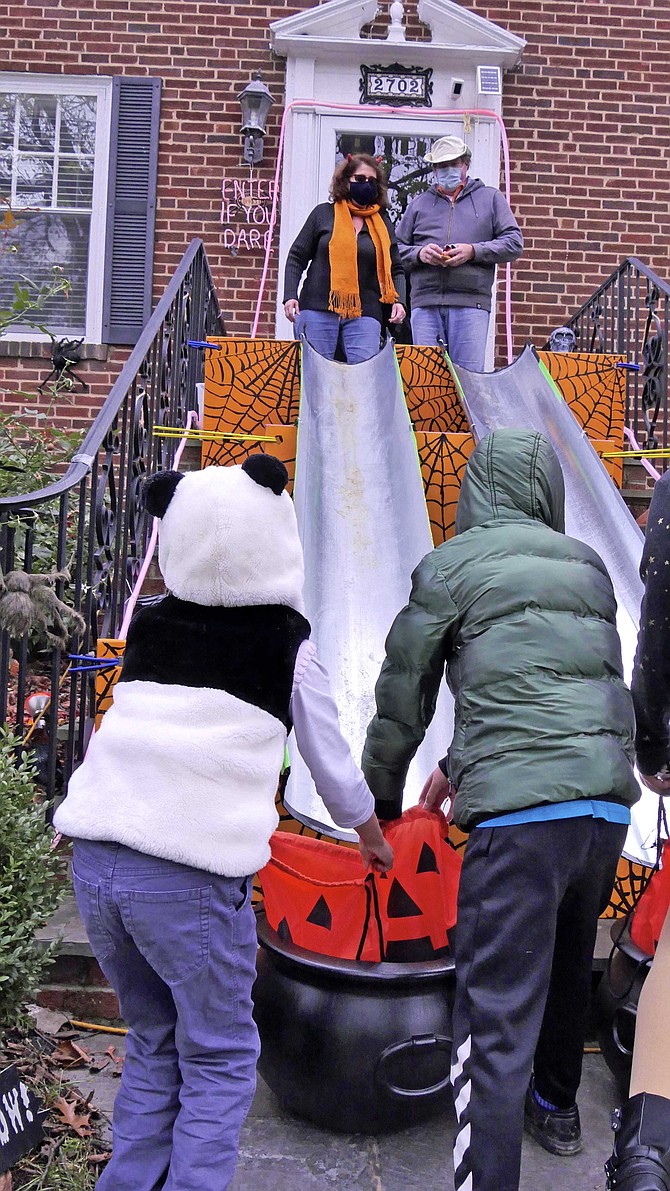 One way to avoid close contact for Halloween trick or treating: Arlington homeowner sends candy or a stuffed animal down one of the two Halloween chutes he built out of leftover heating pipe for Halloween last year.
One way to avoid close contact for Halloween trick or treating: Arlington homeowner sends candy or a stuffed animal down one of the two Halloween chutes he built out of leftover heating pipe for Halloween last year.
“Halloween is very popular in my neighborhood,” said the Bethesda mother. There are hundreds of kids and their parents out and about, almost every house is decorated and the owners give out loads of candy. It will be impossible to avoid crowds and I probably won’t be able to stop my seven-year-old from running up with her friends to every house that’s giving out candy. My three-year-old is frightened by Halloween costume masks, so I don’t know how I’m going to handle that.”
Marked by costumes, trick-or-treating and visiting with friends and neighbors, Halloween is one of the sweetest and most popular holidays of the year. With COVID-19 cases and the Delta variant spreading, navigating this time-honored holiday tradition will be complicated for some parents, especially those with children who are under 12, too young for a COVID-19 vaccination.
"Although trick-or-treating occurs outside where the risk of COVID-19 transmission is less, if kids go in groups, there is likely not to be social distancing and there will be
contact with people in a lot of different households handing out candy,” said Lucy H. Caldwell, director, communications, Fairfax County Health Department. "While some COVID-19 measures are no longer mandatory, it’s still important to take precautions to prevent COVID-19 as disease transmission is still happening in our community at a high level. Wearing a mask would be a good thing to do. The CDC has the Halloween Activity Checklist for Parents.” https://www.cdc.gov/coronavirus/2019-ncov/downloads/daily-life-coping/Trick-or-treating.pdf.
Like Morgan’s daughter, there are young children who are frightened by Halloween
“Even though we all love candy, it’s not worth putting yourself or others at risk."
— Kurt Larrick, Arlington County Department of Human Services.
masks that can offer a layer of protection, says Glenda Hernandez Tittle, PhD. education professor at Montgomery College. "If children are afraid of Halloween, it is important to acknowledge those feelings," she said. "Consider selecting fun and interesting costumes for children. Make the connections that Halloween is about pretending and costumes allow us to do that on this day."
Of all the Halloween traditions, trick-or-treating is one of the riskiest because it often means large groups of children crowded around a neighbor’s front door grabbing for candy.
“Even though we all love candy, it’s not worth putting yourself or others at risk," said Kurt Larrick, Assistant Director, Arlington County Department of Human Services. "Masks, distancing, handwashing, testing, and vaccinations are all important layers of protection when it comes to COVID safety.”
Though COVID might be at the forefront of conversations about Halloween safety, Larrick advises the public not to forget other safety measures. "Drive and bike slowly and take precautions at intersections,” he said. "There will be many more people of all ages walking around on Halloween than your typical weekday evening, so be sure to take extra care."
“Wear reflective clothing, have a flashlight … don’t pet dogs you don’t know [and] don’t eat foods that are not wrapped,” added Caldwell.
